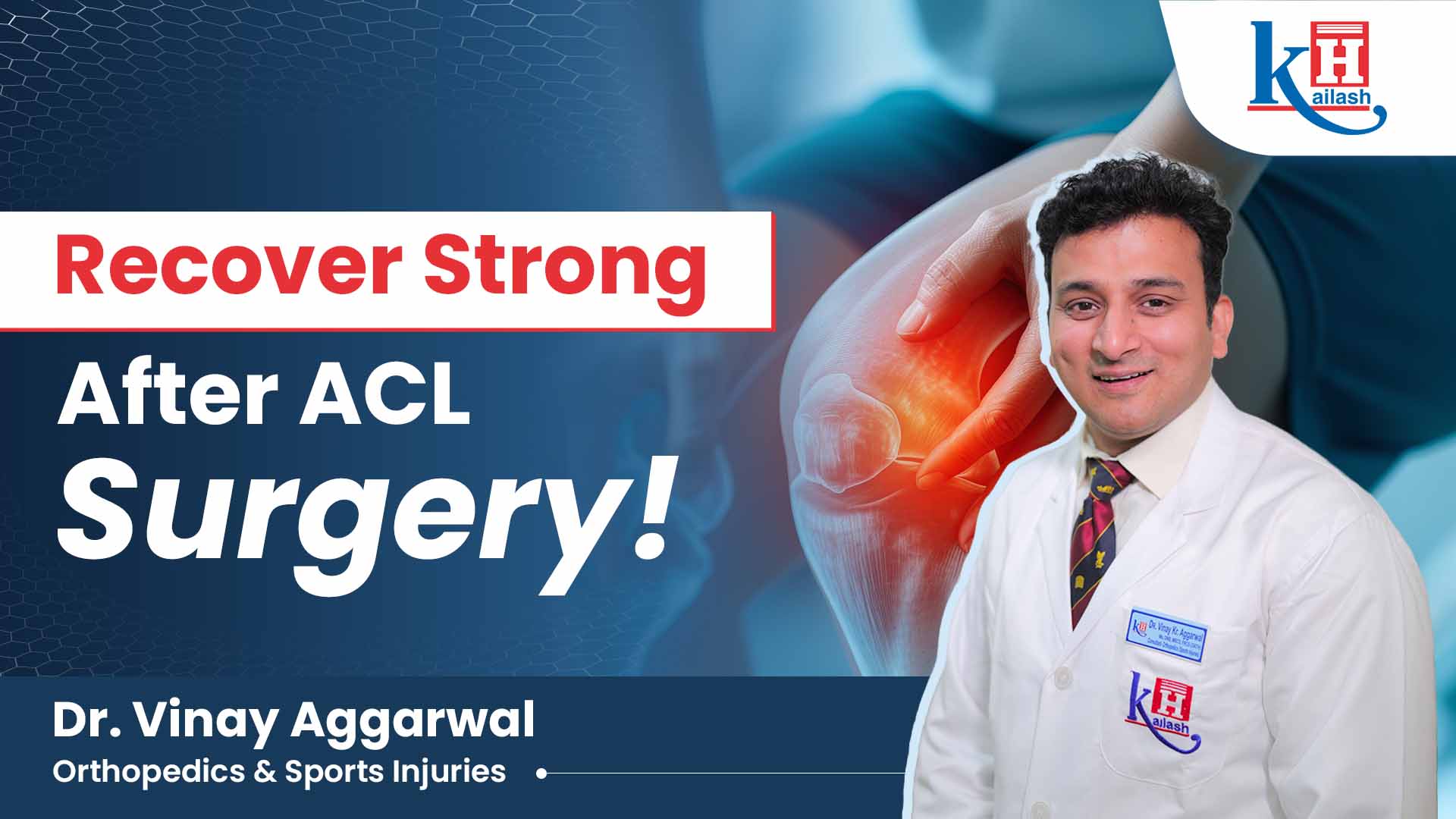Common Orthopedic Problems: When to See a Doctor Feat Dr. Akash Singhal Explain
Verified By Dr. Akash Singhal | 22-Jan-2025
Orthopedic health plays a crucial role in ensuring our overall well-being and mobility. From managing joint pain to addressing injuries, understanding orthopedic issues and their treatment options can empower individuals to lead healthier lives. Dr. Akash Singhal, an experienced Orthopedic Surgeon at Kailash Hospital, Dehradun, shares valuable insights into common orthopedic problems, effective treatments, and the importance of a healthy lifestyle.
This comprehensive guide will delve deeper into Dr. Singhal’s recommendations, helping you understand how to take charge of your orthopedic health.
Table of Content
Orthopedic issues affect millions of individuals worldwide, often limiting their ability to perform daily activities. Dr. Singhal emphasizes that understanding the root cause of these problems is key to effective management. Below are some of the most common orthopedic issues:
1. Osteoarthritis
- What It Is: Osteoarthritis is a degenerative joint disease that causes the breakdown of cartilage, leading to pain and stiffness.
- Symptoms: Joint pain, swelling, and decreased range of motion.
- Risk Factors: Aging, obesity, joint injuries, and genetic predisposition.
2. Back Pain
- What It Is: Back pain is often caused by poor posture, injuries, or degenerative conditions like a slipped disc.
- Symptoms: Pain, numbness, or tingling that may radiate to the legs.
- Risk Factors: Sedentary lifestyles, improper lifting techniques, or prolonged sitting.
3. Sports Injuries
- What It Is: Injuries sustained during physical activity, including sprains, strains, and fractures.
- Symptoms: Swelling, bruising, and limited mobility.
- Risk Factors: Overuse, inadequate warm-ups, and poor technique.
4. Osteoporosis
- What It Is: A condition characterized by reduced bone density, increasing the risk of fractures.
- Symptoms: Fragility fractures, back pain, and loss of height over time.
- Risk Factors: Aging, hormonal changes, and calcium or vitamin D deficiency.
Also read: Can Vitamin D Deficiency Cause Knee Pain?
Dr. Singhal highlights that modern medicine offers a wide range of effective treatment options for orthopedic problems. Here’s a closer look at the approaches:
1. Lifestyle Modifications
For many conditions, the first line of treatment involves making changes to daily habits.
- Exercise: Low-impact activities such as walking, swimming, and yoga can strengthen muscles and improve joint health.
- Diet: A balanced diet rich in calcium, vitamin D, and omega-3 fatty acids supports bone health.
- Posture: Maintaining proper posture can prevent back and neck problems.
2. Medications
Medications can help alleviate symptoms and improve quality of life.
- Pain Relievers: Nonsteroidal anti-inflammatory drugs (NSAIDs) reduce inflammation and pain.
- Supplements: Calcium and vitamin D supplements support bone health.
- Injections: Corticosteroid injections can provide relief for severe joint pain.
3. Physical Therapy
Physical therapy is an integral part of orthopedic care, focusing on rehabilitation and mobility.
- Exercises: Tailored exercises help improve strength, flexibility, and balance.
- Manual Therapy: Hands-on techniques reduce pain and restore function.
4. Surgical Interventions
In advanced cases, surgical treatments may be necessary to restore function and relieve pain.
- Joint Replacement Surgery: For severe osteoarthritis, procedures like knee or hip replacement can provide long-term relief.
- Arthroscopy: Minimally invasive surgery is used to both diagnose and treat issues related to joints.
- Spinal Surgery: Procedures to address herniated discs, spinal stenosis, or fractures.
Osteoarthritis is one of the most common orthopedic conditions, particularly among older adults. Dr. Singhal offers key insights into its treatment and management:
- Early Detection: Identifying symptoms early can prevent the condition from worsening.
- Weight Management: Reducing body weight minimizes stress on weight-bearing joints.
- Assistive Devices: Tools such as braces or canes can improve mobility and reduce discomfort.
Adopting a healthy lifestyle is a powerful tool for preventing and managing orthopedic problems. Dr. Singhal emphasizes the following habits:
1. Regular Exercise
Exercise not only strengthens muscles and bones but also improves flexibility and balance, reducing the risk of falls.
2. Balanced Nutrition
A diet rich in whole grains, lean proteins, fruits, and vegetables supports overall health and prevents deficiencies.
3. Weight Management
Maintaining a healthy weight reduces the load on joints and minimizes wear and tear.
4. Adequate Rest
Quality sleep allows the body to recover and repair itself, which is crucial for bone and joint health.
Also read: Walking After Robotic Knee Replacement: How Soon Can You Get Back on Your Feet?
Dr. Singhal advises seeking medical attention if you experience any of the following:
- Persistent joint or back pain that does not improve with rest or over-the-counter medications.
- Swelling, redness, or warmth around a joint.
- Difficulty walking or performing daily tasks.
- A history of falls or fractures without significant trauma.
Taking action early can stop small problems from developing into more significant issues.
Dr. Singhal also addresses common myths about orthopedic health:
- Myth: Rest is always the best solution for joint pain.
- Reality: While rest is important, excessive inactivity can lead to stiffness and muscle weakness.
- Myth: Only older adults develop orthopedic problems.
- Reality: Conditions like sports injuries and poor posture can affect individuals of all ages.
- Myth: Surgery is the only solution for severe joint pain.
- Reality: Many cases can be managed with non-surgical treatments such as physical therapy and injections.
Also read: Robotic Knee Replacement: The Next Generation in Knee Surgery
Taking a proactive approach can help maintain orthopedic health for years to come:
- Stay Active: Engage in regular physical activity that aligns with your fitness level.
- Wear Proper Footwear: Supportive shoes can prevent foot and ankle problems.
- Avoid Smoking: Smoking weakens bones and impairs healing.
- Get Regular Checkups: Routine health screenings can identify potential issues early.
Orthopedic health is essential for maintaining mobility, independence, and quality of life. By understanding common problems and following expert advice like that of Dr. Akash Singhal, individuals can take proactive steps to protect their joints, bones, and overall health.
If you’re experiencing orthopedic issues or simply want to learn more about maintaining healthy bones and joints, consult a qualified orthopedic specialist. Remember, early intervention and a commitment to a healthy lifestyle are the keys to staying active and pain-free.



 +91-9711918451
+91-9711918451
 international.marketing@kailashhealthcare.com
international.marketing@kailashhealthcare.com







